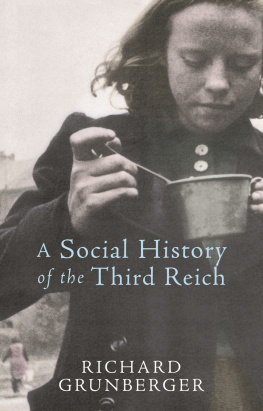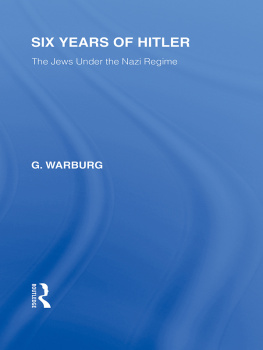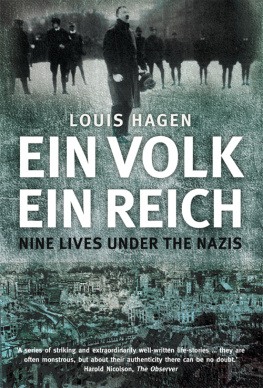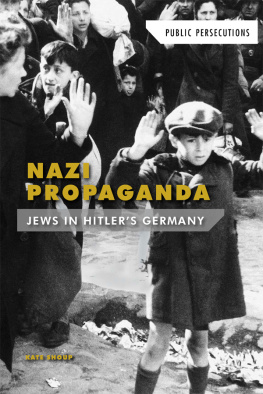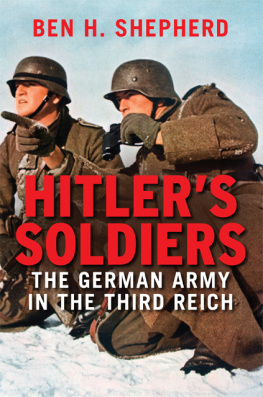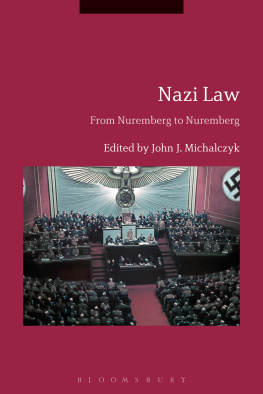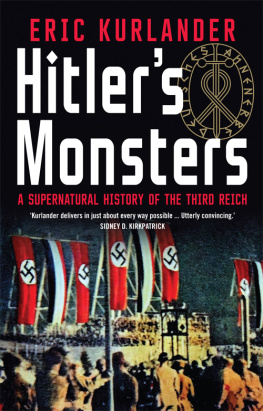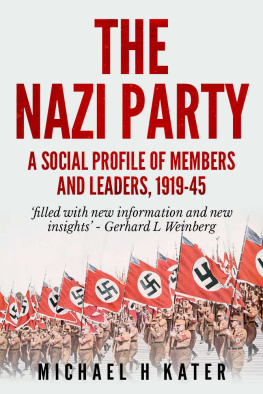Contents
Richard Grunberger was born in Vienna in 1924. He was married with three children and six grandchildren and lived in London. He died in February 2005.
Germany 19181945
Hitlers SS
A Social History of the Third Reich
Red Rising in Bavaria
The Twelve Year Reich: A Social History of Nazi Germany 19331945
A Social History of the Third Reich
RICHARD GRUNBERGER
A Phoenix Ebook
First published in Great Britain in 1971 by Weidenfeld & Nicolson.
First published in ebook in 2013 by Phoenix.
Copyright 1971 by Richard Grunberger
The moral right of Richard Grunberger to be identified as the author of this work has been asserted in accordance with the Copyright, Designs and Patents Act 1988.
All rights reserved. No part of this publication may be reproduced, stored in a retrieval system or transmitted in any form or by any means without the prior permission in writing of the publisher, nor be otherwise circulated in any form of binding or cover other than that in which it is published without a similar condition, including this condition, being imposed on the subsequent purchaser.
A CIP catalogue record for this book is available from the British Library.
ISBN: 978 1 7802 2626 2
Orion Books
The Orion Publishing Group Ltd
Orion House
5 Upper St Martins Lane
London WC2H 9EA
An Hachette UK Company
www.orionbooks.co.uk
To the memory of
Bernard Weber (192355)
A work of this scale involves the cooperation of individuals too numerous to mention; many of the German personalities from ex-Nazi functionaries to former illegal trade unionists involved as interviewees are listed in the index. Others deserving my particular thanks are Tom Wallace, Professor Walter Laqueur, Elizabeth Wiskemann, Terence Prittie, Heinrich Fraenkel, Dr David Schoenbaum, Tim Mason and last but by no means least Janet Langmaid. Institutions I am indebted to are the Deutsche Forschungsgemeinschaft (for a research grant), the Institut fr Zeitgeschichte, Munich, and above all the Institute of Contemporary History and Wiener Library, London.
RICHARD GRUNBERGER
. Grings wedding
. Procession at the opening of the House of German Art (Institute of Contemporary History and Wiener Library, London)
. A one-pot Sunday (Institute of Contemporary History and Wiener Library)
. A Winter Relief sacrificial column (Institute of Contem- and Wiener Library)
. Judges of the Berlin Criminal Court
. The Reich Labour Service at the 1934 Nuremburg Party Rally (Ullstein Bilderdienst, Berlin)
. Mealtime in the Reich Labour Service (Institute of Contemporary History and Wiener Library)
. Navy gymnasts at the 1938 Breslau Sports Festival (Institute of Contemporary History and Wiener Library)
. A Jew carrying a sandwich board through streets (Archiv Gerstenberg, Frankfurt am Main)
. Jews arriving at Auschwitz (Sddeutscher Verlag)
. Gring with the villagers of Mauterndorf (Institute of Contemporary History and Wiener Library)
. A farmers honour diploma (Institute of Contemporary History and Wiener Library)
. Volkswagen cars in 1938 (Institute of Contemporary History and Wiener Library)
. Girls cheering Hitler (Institute of Contemporary History and Wiener Library)
. An exercise at an Adolf Hitler School (Sddeutscher Verlag)
. Hitler Youth marching through Breslau
Open-air theatre and memorial at Annaberg (Institute of Contemporary History and Wiener Library)
. A still from Jud Sss
. Broadcasting the sound of the goose-step (Institute of Contemporary History and Wiener Library)
. Works concert at a Hamburg train depot (Institute of Contemporary History and Wiener Library)
. Housing estate at Stettin (Institute of Contemporary History and Wiener Library)
. Model of the Knigsplatz at Munich (Institute of Contemporary History and Wiener Library)
. Motorway in the Ruhr (Institute of Contemporary History and Wiener Library)
. Professor Thorak working on model for Autobahn monument (Institute of Contemporary History and Wiener Library)
. Hitler Youths Hans Mallon memorial (Institute of Contemporary History and Wiener Library)
. Design for a Castle of the Dead (Institute of Contemporary History and Wiener Library)
. Landsberg concentration camp in 1945 (Ullstein Bilderdienst)
A quarter of a century after the end of the Second World War the German question which caused that war still dominates world affairs though in a vastly different form.
Today the German question is a function of East-West relations and its solution depends more on the world than on the Germans themselves but when it first arose it had little to do with the state of the world and a great deal with that of German society.
The root causes of the German question were very broadly speaking retarded unification (and therefore nationhood), capitalism maturing in a late-feudal setting, and a national preference for konfliktlose synthesis (synthesis without conflict).
Germanys belated emergence as a great power, which led her to a preoccupation with foreign policy and a neglect of home policy and reforms, marked and distorted all her subsequent development. This distortion was compounded by another. In 1871 industry had brought German military triumph, statehood and great-power status, but the agents of that victory the middle classes failed to gain their own political victory, or even a commensurate share of power. (An outward symbol of their failure was the situation of the universities where middle-class students formed associations aping the mores e.g. duelling of the military-agrarian lite when that lite was in economic decline.)
This cumulative imbalance of power had dire consequences: the middle class grew used to trading their political rights for economic advantages; a constitution was evolved that married authoritarian substance to the shadow of universal manhood suffrage. Political opposition to the government became confused with opposition to the country treason. Bismarck described the Social Democrats as vagabonds without a Fatherland.
Scarifying propagandist devices for preventing the alternation of government and opposition, fostered by Bismarcks constitutional gerrymandering, helped to develop the German penchant for Konfliktlosigkeit for sweeping conflict-inducing issues under the carpet and 1918 produced a great trauma precisely because defeat brought in its train a reversal of all these tendencies.
Foreign policy ceased to be Germanys main concern when she became an object rather than a subject in world affairs. The collapse of the Empire put an end to pseudo-constitutionalism and to the exclusion of commoners from political power. The chimera of Konfliktlosigkeit faded further as the Weimar Republic articulated and tried to institutionalize the interplay of contending social and political forces.
One of the most poignant aspects of 191819 was that it was the first, and therefore the seminal, instance in Germany of alternating political parties in office the essence of the democratic process. The Social Democrats, Left Liberals and Catholic Centre, which under the Empire had been permanently relegated to the opposition benches, now became the government but their assumption of office owed less, in the last analysis, to the ballot-box (and to the barricades put up in November 1918) than to Allied arms.

